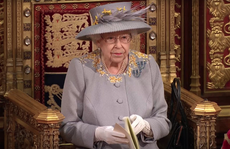The government is to consider ways to limit the sale of foie gras as part of measures to improve animal welfare, ministers have announced.
A new animal welfare bill, unveiled in the Queen’s Speech, will also look at a crackdown on the trade of the delicacy, which involves the force feeding of birds and has been condemned as cruel.
Foie gras, which is often served pan fried or as a pâté, has long been controversial.
Earlier this year Fortnum and Mason announced it would stop importing it and phase out the last of its stock.
The artificially fattened liver of a duck or a goose, foie gras is made using a technique called gavage, force-feeding the birds twice or three times daily, often via a tube down their throats.
The bill will “consider further steps to limit the trade and sale of foie gras”, ministers said.
The legislation will also ban the importation of hunting trophies of endangered animals from abroad, as well as implement the Ivory Act to ban trade in elephant ivory.
And it will end “the export of live animals for fattening and slaughter” as well as what it describes as the “low welfare practice” of keeping primates as pets, improve standards in zoos and crack down on puppy smuggling.
There will also be action on pet theft, amid a rise in the crime during the pandemic.
Mandatory cat microchipping will also be introduced, while the operation of current microchip databases will be reviewed.
The public will also be educated on how to buy pet dogs and cats responsibly.
Ministers say they want to “deliver on our commitment to the highest standards of animal welfare by bringing forward ambitious plans to improve standards and eradicate cruel practices”.
They also claim the UK can “take advantage” of its post-Brexit status outside the EU to “go further in protecting our animals, whether on the farm, at home or in the wild”.









